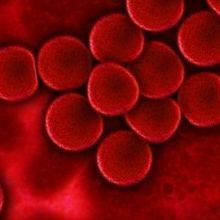Login
Subscribecancer genomics

Q&A: A 10,000-Genome Milestone for Shared Pediatric Cancer Data
Carolyn Wilke | Apr 1, 2019 | 3 min read
Computational biologist Jinghui Zhang of St. Jude realized scientists could work more efficiently with tools and genomic data shared on the cloud.

Hundreds of Inherited Gene Variants Contribute to Cancer
Abby Olena, PhD | Apr 5, 2018 | 3 min read
In the largest study of its kind to date, researchers find more than 850 rare, heritable genetic alterations that can predispose humans to cancer.

Researchers Publish First Pan-Cancer Genomic Analyses in Pediatric Patients
Catherine Offord | Feb 28, 2018 | 2 min read
Two large-scale studies reveal new insights into the genomic characteristics of childhood cancers.

Clarivate Ranks Most-Cited Researchers of 2017
Catherine Offord | Nov 15, 2017 | 2 min read
China shows the biggest increase of any country in the number of scientists listed since last year, while cancer genomics emerges as one of the more dominant fields.

More than 18,000 Genomic Records from Cancer Patients Available
Kerry Grens | Jun 1, 2017 | 2 min read
The publicly available database found nearly a third of samples included mutations targeted by either approved drugs or therapies in clinical trials.

Angela Brooks: Splicing Specialist
Diana Kwon | Apr 1, 2017 | 3 min read
At the University of California, Santa Cruz, the researcher combs the cancer genome, looking for weaknesses.

Cancer Genomes
The Scientist Staff | Mar 31, 2017 | 1 min read
April Scientist to Watch Angela Brooks of the University of California, Santa Cruz, discusses her search to find vulnerabilities buried within the genomes of cancer cells.

AACR Q&A: Elaine Mardis
The Scientist Staff | Apr 18, 2016 | 1 min read
The genomics pioneer shares the sessions she most looks forward to at this year’s American Association for Cancer Research annual meeting.

Direct-to-Consumer Liquid Biopsy
Kerry Grens | Sep 13, 2015 | 2 min read
Some doctors advise shoppers to be skeptical of a newly marketed cancer diagnostic.

Making Sense of the Tumor Exome
Kerry Grens | May 18, 2014 | 3 min read
An algorithm can pick out biologically and clinically meaningful variants from whole-exome sequences of tumors.

Watson Challenges Cancer
Kerry Grens | Mar 20, 2014 | 1 min read
The IBM supercomputer, famous for its game show performance, will aid in cloud-based analyses of genomic data.

Retracing Steps
Aimee Swartz | Nov 11, 2013 | 3 min read
Sage Bionetworks aims to show that transparency and sharing are key to ensuring research reproducibility.

Bacterial DNA in Human Genomes
Ed Yong | Jun 20, 2013 | 4 min read
A new study finds strong evidence that bacteria can transfer genes into human genomes, especially in cancer cells.

Identifying Spurious Cancer Mutations
Dan Cossins | Jun 19, 2013 | 2 min read
Researchers reveal why analyses of cancer-causing mutations are riddled with false positives and demonstrate a new approach that eliminates the problem.

Week in Review: April 8-12
Jef Akst | Apr 12, 2013 | 3 min read
Hot topics from the AACR meeting; the ongoing debate about pesticides’ effects on bees; a treasure trove of baby dinos; conservation on social media

Sequencing Cancer
Jef Akst | Apr 9, 2013 | 2 min read
This month’s AACR attendees, including National Cancer Institute Director Harold Varmus, discuss new approaches to cancer research using whole genome sequencing.

Up, Up, and Array
Megan Scudellari | Apr 1, 2013 | 8 min read
By scrutinizing gene expression profiles instead of individual oncogenes, Todd Golub launched a powerful platform for diagnosing, classifying, and treating cancer.

Cancer Clinical Trials of Tomorrow
Tomasz M. Beer | Apr 1, 2013 | 4 min read
Advances in genomics and cancer biology will alter the design of human cancer studies.

Making Cancer More Transparent
Mary Beth Aberlin | Apr 1, 2013 | 3 min read
A decade into the age of genomics, science is generating a flood of data that will help in the quest to eradicate the disease.

Models of Transparency
Joan K. Heath, Richard White, Kirsten C. Sadler, and David Langenau | Apr 1, 2013 | 10+ min read
Researchers are taking advantage of small, transparent zebrafish embryos and larvae—and a special strain of see-through adults—to understand the development and spread of cancer.